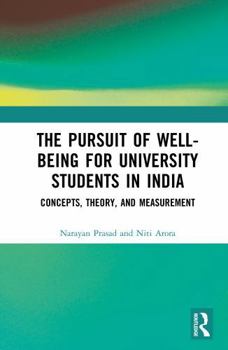The Pursuit of Well-Being for University Students in India: Concept, Theory and Measurement
This book details the concept, theory, and measurement of "human wellbeing," in general, with a focus on university students in India. It investigates the experiences and correlates of wellbeing of Indian undergraduate students with the aim of enabling policymakers to plan and implement policies in the pursuit of a better quality of university life for students.
The book analyses the status and experience of wellbeing of university students in a holistic manner by studying the various dimensions of their wellbeing. It identifies the areas of deficiency and addresses the issues of unrest faced by them. The framework encompasses six dimensions of student wellbeing, namely educational wellbeing, perceived economic wellbeing, health wellbeing, social wellbeing, wellbeing in the personal domain and factors contributing to psychological distress (a negative indicator). It examines the differences in the status of wellbeing with respect to their gender, place of origin and the social groups they belong to. It proposes recommendations to strengthen their wellbeing and presents a roadmap suggesting further scope of research in this area.
This volume will be of interest to students, teachers and researchers of psychology, social psychology, sociology, mental health and wellbeing and economic psychology. It will also be useful to policymakers, counsellors, psychologists, academicians and those interested in wellbeing in general.
Related Subjects
Psychology




